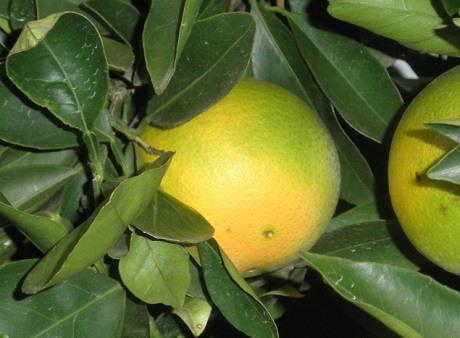On 24 October, officials from the National Plant Protection Organisation of South Africa (NPPOZA) of the Department of Agriculture, Forestry and Fisheries and the Citrus Growers’ Association gave growers, packhouses, forwarding agents, exporters and traders, an overview of the past season during the annual citrus coordinating meeting. It kicked off with an overview of the season in the European Union.
Tankiso Mpholo, the national coordinator on citrus black spot (CBS) at DAFF, told delegates during his presentation that there were a total of 105 local interceptions of CBS during the past season on South African citrus, coming quite early in the season already. The majority of interceptions were still made on Valencias from Limpopo and Mpumalanga where a decrease was visible. There was also an increase of interceptions on lemons and grapefruit.
More than a thousand orchards were voluntarily withdrawn from sending to the EU, mostly in Limpopo and Mpumalanga, a figure that is up by about a hundred over last year. “Whenever we negotiate with the EU, this is what we argue: the growers are still the biggest participants in CBS risk management, so for us this increase in orchard withdrawals is very comforting as this shows accountability and responsibility.”
Presenters at the coordinating meeting: Patrick Magadani (DAFF), Poppie Molebatsi (DAFF), Julie Mokwele (DAFF), Willy Madiba (DAFF), Paul Hardman (CGA), Ernest Phoku (Director of the Directorate Inspection Services at DAFF), Liezl Wentzel (DAFF) and Tankiso Mpholo (DAFF)
SA shows dramatic drop in CBS interceptions at EU
There were two CBS interceptions which is South Africa’s best performance since CBS measures have been in place but, as Tankiso noted, this figure might have been higher if Valencia exports to the EU hadn’t been stopped by 22 September.
He compared South Africa’s tally of 2 with interceptions from other countries: on shipments from Argentina there were 17 CBS interceptions, 12 interceptions on Brazilian shipments, and three each for Swaziland and China.
On 31 March 2019 the regulations prescribing CBS measures expire and it is still uncertain how, and if, it will change.
South Africa not yet fully FCM compliant
In the European Union there were nine FCM interceptions, seven made in the Netherlands and two in the UK, a huge drop compared to the 68 of last year but, however, still unsatisfactory in a zero tolerance environment.
Of the nine FCM interceptions, four came from Limpopo Valencias, one from an Eastern Cape Valencia, two from Limpopo soft citrus and one each from Western and Eastern Cape navels.
He showed participants an extract from a letter that South African authorities have received from the EU on this matter, which states that South Africa needs to do more to prevent a recurrence. “In conversations with the EU they’ve basically told us that if we can’t manage it for ourselves, they’ll manage it for us,” he said, noting that the South African industry was under pressure to get FCM under complete control.
 FCM infected fruit
FCM infected fruit
Fruit type and regional profiling to determine FCM risk
Locally, there were 130 FCM interceptions at packhouses on shipments destined for the EU. An audit conducted by DAFF showed that it would be possible to profile fruit types per region for FCM risk: oranges from the Western Cape, Eastern Cape and Limpopo are high-risk groups, grapefruit from Limpopo and soft citrus from Mpumalanga.
Most FCM interceptions occurred in Limpopo, which shows a slight decrease, while there are significant reductions in FCM incidence in both the Eastern and the Western Cape.
He also noted that KwaZulu-Natal was showing a risk of FCM quite disproportionate to its contribution to South African citrus volumes.
In total, when considering citrus shipments to all markets, there were a total of 604 FCM interceptions.
There still are, he said with dismay, growers and packers who claim that they don’t know what FCM is or what the FCM Management System (FMS) entails, but they are the minority.
National Plant Protection Organisation of South Africa officials: Front: Kuben Naidoo, Maanda Rambauli, Salamina Maelane, Rorisang Mahlakoana, Canny Makwaeba, Rejoice Muavhi. Back: Charles Nengovhela and Tshivhidzo Sikhwari
Packhouse verification among recommendations
The National Plant Protection Organisation of South Africa has a number of recommendations, among them the suspension of production units and packhouses that, for various reasons, refuse to be audited as well as a suspension of PUs and packhouses that have submitted fraudulent FMS documentation.
Prior to registration for the EU, packhouse compliance with FMS will need to verified.
Packhouses registered for the EU will be blacklisted if there are four or more FCM interceptions, regardless of the destination of the particular shipments.
Other proposed measures would be the setting up of a national database of companies and individuals that advise citrus growers on CBS and FCM, with a requirement to only make use of the services of entities vetted by the National Plant Protection Organisation of South Africa.
The shipping line number could be replaced with the Phytclean key number on addendum to easily verify which pallets are to be loaded for the EU.
For more information:
Tankiso Mpholo
DAFF: National Plant Protection Organisation of South Africa
Tel: +27 12 309 8775 / 8740
Email: [email protected]
